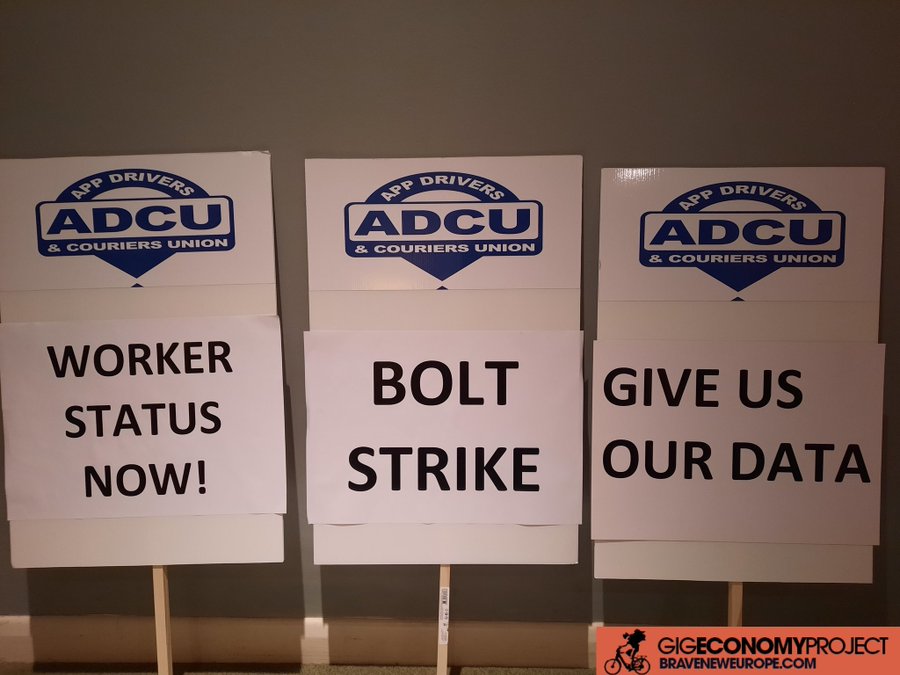Bolt drivers demand worker status, an end to unfair dismissals and an extra £2 per mile in 24 hour strike
The Gig Economy Project, led by Ben Wray, was initiated by BRAVE NEW EUROPE enabling us to provide analysis, updates, ideas, and reports from all across Europe on the Gig Economy.
This series of articles concerning the Gig Economy in the EU was made possible thanks to the generous support of the Foundation Menschenwürde und Arbeitswelt


Picture source:ADCU
Private hire drivers at Bolt, the second biggest ride-hail firm in the UK after Uber, are on a 24-hour strike today [22 June] to demand that the company respects the UK Supreme Court ruling in February on the labour status of Uber workers.
The App Drivers & Couriers Union (ADCU), which has organised the strike, say the working conditions of Bolt and Uber drivers are “identical”, and therefore the company should provide the same protections, including holiday pay and a pension scheme, that UK Uber drivers now receive.
Additionally, Bolt drivers are unhappy about drivers being de-activated from the app with no right to appeal, and want fares increased to at least £2 per mile.
The ADCU is calling on drivers to refuse to use the Bolt app for 24 hours, and is asking passengers to boycott the app all day. A protest was held outside the Bolt offices in Chiswick, West London, on Tuesday morning. The union also announced that it would be pursuing legal action against Bolt, claiming worker status.
Speaking ahead of the strike, Abdurzak Hadi, Chair of ADCU London said: “Bolt can no longer just bury its head in the sand and pretend that their drivers and our members are not entitled to the same rights as Uber drivers.
“This strike and protest is Bolt’s last chance to do the right thing, obey the law and respect their drivers. If they do not meet our demands then we will not hesitate to immediately launch legal action.
“For today, we ask all drivers and passengers to observe the digital picket line by not opening the app during the twenty four hour period.”
Responding, a Bolt spokesperson told TaxiPoint: “Bolt wasn’t operating in London in 2016 (the time frame for the Supreme Court ruling) and our model is different.
“We maintain regular dialogue with drivers regarding many topics, through surveys, newsletters, social platforms and in-person forums. They tell us they like Bolt because it charges less commission – as low as 10% for drivers with electric vehicles – resulting in higher average earnings when on a trip.”
The Supreme Court ruling in February, a case which had been brought forward by the ADCU union, found that Uber drivers were workers, not independent contractors, and that they are working from the moment the log-in to the app to log-out.
Uber responded to the ruling by announcing that it would recognise its UK drivers as workers, announcing a system to reflect holiday pay, a pension scheme and a guarantee of minimum wage from pick-up to drop-off. This last point fell short of the Supreme Court’s ruling, meaning Uber drivers still earn up to 40-50% of what they are legally entitled to.
In May, Uber and the GMB trade union announced a recognition agreement, an international first for the company, but the details were criticised by grassroots unions, including ADCU, for the lack of inclusion of collective bargaining on wages, including the minimum wage, in the deal.
Uber and GMB have called on Bolt and other ride-hail platform companies to accept worker status for drivers following the Supreme Court verdict and reach a similar recognition agreement.
Ahead of the strike, Bolt offered drivers a special bonus of £80 if they complete 30 trips in London on the day of the strike and two days after, a move the ADCU described as “desperate, desperate stuff”.


Be the first to comment